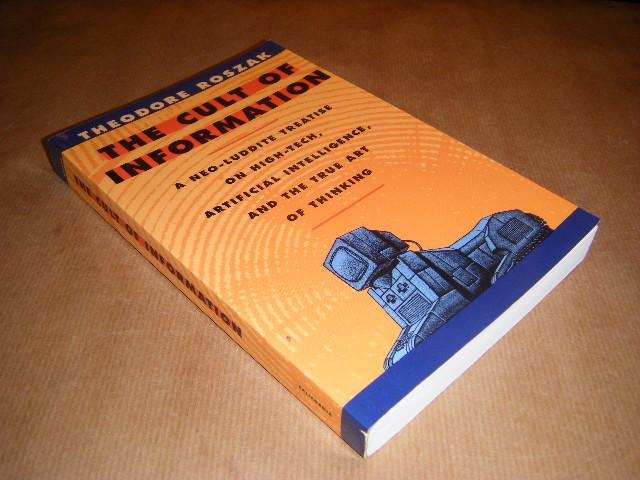The mind is an empty vessel, waiting to be filled; or the mind is a machine, breaking down sometimes.
Nowadays, the mind is often described as being a computer, processing information.
Writer and social theorist Theodore Rozak disputes that model in his book The Cult of Information.
He says that the word is over-used, and the mind works more by juggling ideas than sifting through information.
In fact, says Rozak, some of the most important ideas have no information at all.
"The example I use most prominently in the book is one that should be of...familiar enough to all Americans: All men are created equal.
我在書里用的最明顯的例子也是所有美國人耳熟能詳?shù)模喝巳松降取?/div>
Very powerful idea, has absolutely no connection with information.
這是很有力的觀點,與信息絕對無關(guān)。
The people who developed that idea and used it for revolutionary purposes were not drawing upon some body of research,
想出這個觀點并將它用于變革性用途的人并未利用任何研究機構(gòu)、
some facts and figures about the whole human race.
事實、關(guān)于整個人類的數(shù)據(jù)。
That's not what that idea is based upon. It's based upon experience and upon moral vision.
這些都不是這個觀點的基礎(chǔ),它的基礎(chǔ)是經(jīng)驗和道德觀。
And there are so many ideas like that, and I try to remind people, in this critique,
跟它相似的觀點也有很多,我想要在這個評論文章中提醒大家,
that most of what's going through their mind when they're thinking most of the time,
自打出生以來,人們絕大多數(shù)時候
the run of ideas that they've learned from the cradle on up, many of which are matters of wisdom,
劃過腦海的都是有關(guān)智慧、
of judgment, of insight, of intuition that have nothing to do with facts and figures or with information."
判斷、洞察力、直覺的問題,這些都跟事實、數(shù)據(jù)、信息無關(guān)。
"You write on page 213, you say, 'What I am suggesting is that in little things and big,
您在第213頁寫道,我想說的是,無論是大事還是小事,
the mind works more by way of Gestalt than by algorithmic processes.
人類的大腦與其說是在執(zhí)行算法,不如說是在進行完形。
That is because our life as a whole is made up of the hierarchy of projects, some trivial and repetitive, some special and spectacular.
這是因為我們整個的生活都是由不同層級的項目組成的,有些項目是瑣碎而又機械重復(fù)的,有些是特殊而又意義非凡的。
Pondering choices, making projects: these are the mind's first order of business.
考慮抉擇就是做項目;這是大腦處理的次序。
This is so obvious, so basic that perhaps we are only prompted to reflect upon it
這一點再明顯、再基礎(chǔ)不過了,所以但凡有新觀點出現(xiàn)的時候,
when a different idea about thinking is presented, such as that thought is connecting data points in formal sequences."
我們都會不由自主地想到這個觀點,也就是思考的過程就是將數(shù)據(jù)點以正式的順序連接起來。

"What I'm trying to defend is the idea that thinking takes place on many levels.
我想力挺的論點是:思考是在很多層面上進行的。
And the lowest level of all is data procelling or information processing.
最低的層面是數(shù)據(jù)處理,或者說信息處理。
And it worries me if we try to sell people on the idea, and especially kids in the classroom
我可不想向大家灌輸一種觀點,尤其是不想向孩子灌輸一種觀點,
that what they are doing when they are thinking is essentially something that should be modelled upon what a computer does.
即他們做事情以及思考的時候其實是像計算機一樣在運作。
Well, I think that's a disaster because it is lowering the capacities of the human mind to the lowest levels of thinking
我覺得這樣做無異于人間災(zāi)難,因為這種觀點太過看輕人類大腦的能力,
rather than acquainting kids gracefully and critically with all the higher levels of thinking
而非以優(yōu)雅、辯證的方式來教會孩子最高層級的思考方式,
that we normally go through in the course of every day of our life."
而我們本來每天都在進行最高層級的思考方式。
"All right. There are things that are subjective. There are things like creativity and intuition.
怎么說呢,這些事情都是主觀的,比如創(chuàng)造性和直覺。
But suppose that our experience of those things that is what we experience on the subjective level;
但假設(shè)我們對這些事情的體驗都是主觀層面的,
on another level, the level that scientists study, these things are in fact productions and outcomes of conscious computational processes."
那么在另一個層面上,也就是科學家研究的層面上,這些事情其實都是有意識的計算流程的產(chǎn)出和結(jié)果。
"As a hypothesis, it's perfectly respectable.
這個假設(shè)完全是值得受到尊敬的。
The problem is that people working in the field of artificial intelligence have found themselves,
問題是,人工智能領(lǐng)域的工作人員發(fā)現(xiàn)無論他們自己是否愿意,
willingly or not, linked to a piece of machinery, a computer which they use as their model.
都與機械原理有關(guān),就像是他們用作模型的計算機一樣。
I think this has had a very corrupting influence upon people working in the academies, in the field of artificial intelligence.
我認為這種想法會讓學術(shù)界和人工智能領(lǐng)域的人自甘墮落。
It links them with a massive vested economic interest in our society which is our to sell computers for every purpose you can think of,
這種想法將人和社會上大規(guī)模的既得經(jīng)濟利益聯(lián)系在一起,就好像我們做什么事情都是在推廣計算機一樣,
from storing recipes in your kitchen at home to running the Star Wars anti-ballistic missile defensive system."
無論是廚房里的菜譜還是《星球大戰(zhàn)》中的反彈道導(dǎo)彈防御系統(tǒng)。
"And yet, if you muck about with people who are doing artificial intelligence,
不過如果跟人工智能領(lǐng)域的人閑聊的時候,
some of the discussions are the most fascinating discussions I've ever had in my life."
有些對話是我人生中最有意思的一些了。
"The people in artificial intelligence have been making promises of the highest level for a very long period of time
很長時間以來,人工智能領(lǐng)域的從業(yè)者都會做高大的不能更高大的承諾,
and always telling us that great breakthrough in their field
他們總是跟我們說,人工智能領(lǐng)域的巨大突破
is going to happen within the next few years, three years, five years, something of that sort.
將在未來幾年內(nèi)發(fā)生,可能三五年就會出現(xiàn)。
you know, my question to the people in that field is a very simple one, you know.
但我想問他們的問題也再簡單不過。
Deliver the goods, show us that you can do it.
拿出鮮活的例證,做給我們看。
And my suspicion that it can't be done, because they're using the wrong model of the human mind.
我甚至懷疑這件事是否能做成,因為他們從最開始就不應(yīng)該將人類大腦比作計算機,這是錯誤的。
Well, we could go on disputing that academically for a very long period of time.
未來的很長一段時間里,我們依然可以從學術(shù)角度辯駁這個問題。
The fact is they're already involved in selling that idea to the public as a form of machinery out there in the world."
但事實是他們已經(jīng)開始用一個觀點給公眾洗腦了,那就是:人腦就是計算機。
Theodore Rozak is author of The Cult of Information: The Floklore of Computers and the True Art of Thinking.
希歐多爾是《信息崇拜:計算機的民間傳說以及思考的真正藝術(shù)原理》的作者。


